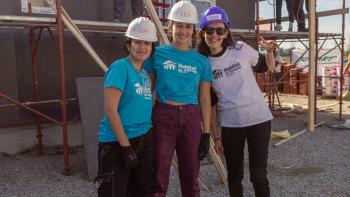Country Facts:
Capital – Yamoussoukro
Population – 28.2 million
Life expectancy – 59 years
Unemployment rate – 7%
Below poverty line – 11.4%
* International poverty line of US$2.15 (World Bank)
Habitat Facts:
-
Habitat started working in Cote d’Ivoire in – 1999
-
• Individuals served with drinking water – 1,400
• Individuals served with sanitation facilities – 5,730
• News houses built – 07
• School latrines constructed – 04
• Household latrines constructed – 946
• Volunteers engaged – 400
• Volunteers hours – 28,000
• People trained – 3,410
The housing need in Côte d’Ivoire
The cumulative housing deficit in Cote d’Ivoire was estimated at 600,000 units in 2015. In the country’s major urban center of Abidjan alone, the housing deficit is estimated from 40,000 units per year.
In rural areas, 90% of people live in temporary structures, which are vulnerable to fire and require extensive upkeep and repair. Walls - typically made of mud in a wooden frame - are prone to cracking, causing leaks and eventually falling apart. Thatch roof houses harbor numerous disease-carrying insects, such as malarial mosquitoes and the tsetse fly, which can spread eye disease. Moreover, a 2016 survey showed that only 18.1% of households possessed a pit latrine, while 92.5% used unsafe drinking water.
How Habitat addresses the need
Major programs
Habitat Côte d’Ivoire’s work focuses on water, sanitation and hygiene; community-led total sanitation; Orphans and Vulnerable Groups housing; “Save and Build” houses; and advocacy for land property.
We work with local government departments and community members to provide sustainable solutions to housing needs, access to clean water and solutions to livelihood challenges.
Access to proper sanitation is essential as the prevalent lack of safe water reduces school attendance and compromises health for children. Also in schools, many disabled children do not drink or even eat all day to avoid going to improper toilet facilities.
House construction
Many families live in mud houses or crumbling old structures. Most have leaking roofs and broken or cracked walls, which cannot keep out tropical downpours that recur during the rainy season. Habitat Côte d’Ivoire helps build houses and latrines using appropriate technology and local building materials. The designs are simple and spacious and cater to the individual families’ needs, while remaining affordable for the homeowners. Houses consist of two or three bedrooms and a hall.
Recently, 48 smaller houses were built with soil blocks in order to help vulnerable familiesto help vulnerable families, particularly older people, improve their living conditions in the village of Dida N’Glossou in the central region. In the span of a decade, the number of older people in Côte d’Ivoire has risen sharply to 63.4%, representing an average annual growth rate of 5%.
What you can do
DONATE
Please visit habitat.org/donate and select “Designate your donation” to donate to Habitat Côte d ´Ivoire.
VOLUNTEER
The Global Village program is resuming region by region until a safe and quality experience can be provided at scale worldwide. Please visit habitat.org/gv for more information and updates.
TITHE
Habitat affiliates in the U.S. support the international work through an annual tithe. For additional information, email [email protected] or contact your local Habitat organization.
CONTACT
Habitat for Humanity Cote d’Ivoire, Cocody, Les Vallons, Immeuble Framire , Abidjan, Cote D’Ivoire
Phone: +225 2241 9775
Email: [email protected] Website: habitatci.org
facebook.com/habitatforhumanityci twitter.com/ habitatci
youtube.com/@habitatforhumanityci


